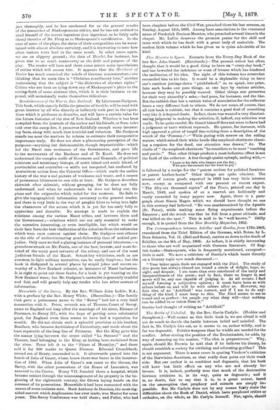Five Minutes to Spare. Extracts from the Every-Day Book of
the late Rev. John Guard. (Hatchards.)—The present writer has often thought that it would be a good thing to have an " every-day book," and has bewailed the indolence or want of leisure which has hindered the realisation of his idea. The sight of this volume has somewhat reconciled him to his fate. It would be a deplorable thing to have one's careless jottings-down " pitchforked," so to speak, into print. Into such books one pots things, as one lays by various articles, because they may be possibly wanted. Other things one preserves for their very absurdity's sake,—bad puns, for instance, and the like, But the rubbish that has a certain value of association for the collector bears a very different look to others. We do not mean, of course, that all this book is rubbish, but that it contains a good deal of something very like it is beyond doubt. In fact, there was wanted a very discrimi- nating judgment in making the selection, if, indeed, any selection was made. To be quite candid, Mr. Guard himself does not seem to have had a judgment or taste without reproach. He quotes, for instance, with high approval a piece of turgid fine-writing from a description of the wreck of the 'Pomona :'—" While gazing with sorrow on the rolling waters, which raised their white heads like surpliced-choristers chant.- ing a requiem for the dead, our attention was drawn," &o. The simile of " the surplieed-choristers "he considers to be most " touching and poetic." That other things produce a most ludicrous effect is not the fault of the collector. A fine though quaint epitaph, ending
"Large is his debt who lingers out the day ; Who goes the soonest has the least to pay"
is followed by a recipe for the " patent reviver for polished furniture or patent leather-boots." Other things are quite obsolete. The amount of cotton goods exported in 1833 has very little interest now, except as compared with our present or recent export. "The fifty-six thousand copies" of the Times, printed one day in March, 1849, and spoken of as a marvel; are habitually and vastly exceeded by many papers now. Again, there is a para- graph about Simon Magus which we should have thought no one in this century had believed. "He was anathematised by the Apostle (St. Peter), while making some flying experiments before the Emperor ; and the result was that he fell from a great altitude, and was killed on the spot." This is said to be "well known." Oddly enough, it is quoted from the New Monthly Magazine, 1852.


































 Previous page
Previous page